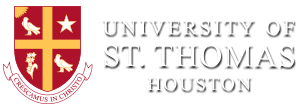Be Bold Blog
The University of St. Thomas (UST) is Houston’s Catholic University, committed to the Catholic intellectual tradition and the dialogue between faith and reason. Our blog is dedicated to helping you explore your future career possibilities and how to make the most of your college experience.
How to Find Jobs in Houston: A Guide for College Students

Maybe you’re committed to a major but haven’t decided what type of position to pursue after graduation. Or perhaps you graduated recently and are still looking for work in your field of study. No matter what your reason for job hunting in the Bayou City, you’re in need of guidance and could benefit from a local’s perspective.
We compiled this guide on how to find jobs in Houston, which includes helpful insight from Paula Marsh, Director of Career Services at University of St. Thomas – Houston (UST). With years of experience helping students discover their vocation and find professional opportunities in the area, her advice can help you do the same.
Understanding the Houston job market and economy
There are many things that make Houston an exciting place to live and work. The old adage “Everything’s bigger in Texas” rings especially true for Houston, the fourth most populous city in the country and the largest in the entire American south.
Population: There are over 2.3 million people living within the city limits, and the greater Houston metropolitan area is home to 7.15 million people.
Demographics: The nation’s fourth largest city is fast growing, incredibly multicultural and one of the youngest. A 2021 Wallethub survey named Houston the most diverse city in the nation.
Economy: Houston has many nicknames that reflect its unique character. One of its most popular monikers is the Space City, in honor of NASA’s manned spacecraft center that landed humans on the moon in 1967. The aerospace industry established deep roots in the area and is still present today, along with other top sectors such as:
- Energy and oilfield equipment
- Healthcare
- Aeronautics
- Manufacturing
- Tourism
- Banking and financial services
- Transportation
The city also contains 24 Fortune 500 headquarters, the third-highest number in any U.S. municipality, only outnumbered by New York City and Chicago.
Job growth: The Houston metro has a huge economy — in 2020 there were 3.1 million jobs counted in the area, based on government data. The Greater Houston Partnership forecast for 2021 predicts that jobs will grow in almost every sector, with the exception of energy and retail.
4 Tips for how to find a job in Houston
Having reviewed the information above, it’s easy to see why Houston is a great city to launch a career. “It’s the diversity, resilience and community spirit that make the Houston job market so special,” according to Marsh.
But how can you get started finding a job in Houston? Keep reading for some actionable advice you can apply to your career search.
1. Polish your resume and cover letter
Let’s start with the basics. The vast majority of professional jobs will require you to submit a resume or curriculum vitae (CV), and often will ask for a cover letter as well. If you’ve been using the same resume since freshman year or hastily pulled one together without much thought, now is a good time to start fresh.
Seeing as this is your very first chance to make an impression with your prospective employer, it’s absolutely imperative that your documents are free of any typos or other errors. Make sure whatever you’re sending has been edited and proofread by at least one other person.
Need advice on how to put perfect these important job search elements? Resources like LinkedIn are a great place to find tips and tricks for improving resumes or cover letters.
2. Be proactive about networking
Don’t be intimidated by the idea of networking. You won’t have to make awkward small talk at a happy hour event unless you want to do so. Instead, consider engaging in opportunities that allow you to learn more about your field like projects, symposiums, volunteering and job shadowing.
Reaching out to people in your field or area of interest is the best way for you to build your professional network. As uncomfortable as it may seem in the moment, keep in mind that the person who has the job you want right now likely faced the same scenario early in their career.
“Join alumni networks, professional and trade organizations in your chosen field,” Marsh advises. She goes on to stress the importance of LinkedIn as a tool and resource for job seekers.
Before you start contacting people on LinkedIn though, make sure that your profile has all the following components:
- A recent, professional-looking headshot (no selfies, party pics or group photos).
- A summary that clearly outlines the kind of jobs or other opportunities you’re looking for and why.
- All internships and jobs you’ve had in the last five years
- Accurate dates and descriptions of responsibilities. Aim for at least three sentences for each entry.
- You can include select examples of part-time positions that may not be directly related to your chosen field. Try to highlight some of the transferable skills you learned in these jobs (e.g., time management, customer service, teamwork, etc.)
- Relevant volunteer and extracurricular experiences
3. Check new job postings often
New positions are constantly being posted online, and the earlier you discover them the better. You don’t want to reduce your chances of getting an interview by applying on the day the listing expires. Sign up for alerts and daily digest emails so that you can easily scan your inbox for promising leads.
As always, it pays to be cautious when sending your personal information online. There are plenty of scams and dodgy websites that prey on job seekers, so try starting with these reputable sites:
4. Leverage your alumni network
Alumni are a valuable and often overlooked resource for students and job seekers. Reach out to graduates of your university via the alumni relations office, Career Center or LinkedIn. Most alumni are happy to let you “pick their brain” and learn from their experience.
“At UST, alumni connect with students as early as their freshman year,” Marsh shares. “They offer guidance and support through mentoring, informational interviews and coffee chats.”
Get the support you need to land your dream job after graduation
Ultimately, Marsh’s best advice for students is to “Take time to learn about what you love to do. Research and explore careers, organizations, and industries to ensure you find your passion and purpose, and be patient with the process – the best is yet to come!”
Did you know that 93 percent of UST graduates are employed within six months after graduation? Learn more about University of St. Thomas Career Services Center and how it helps students succeed even after graduation.
Ready to take the next step?
Related articles
About UST
The University of St. Thomas (UST) is Houston’s Catholic University, committed to the religious, ethical and intellectual traditions of Catholic higher education. For more than 70 years, we’ve been graduating students like you into successful careers in medicine, education, business, public administration and more – throughout Houston and across the globe.

